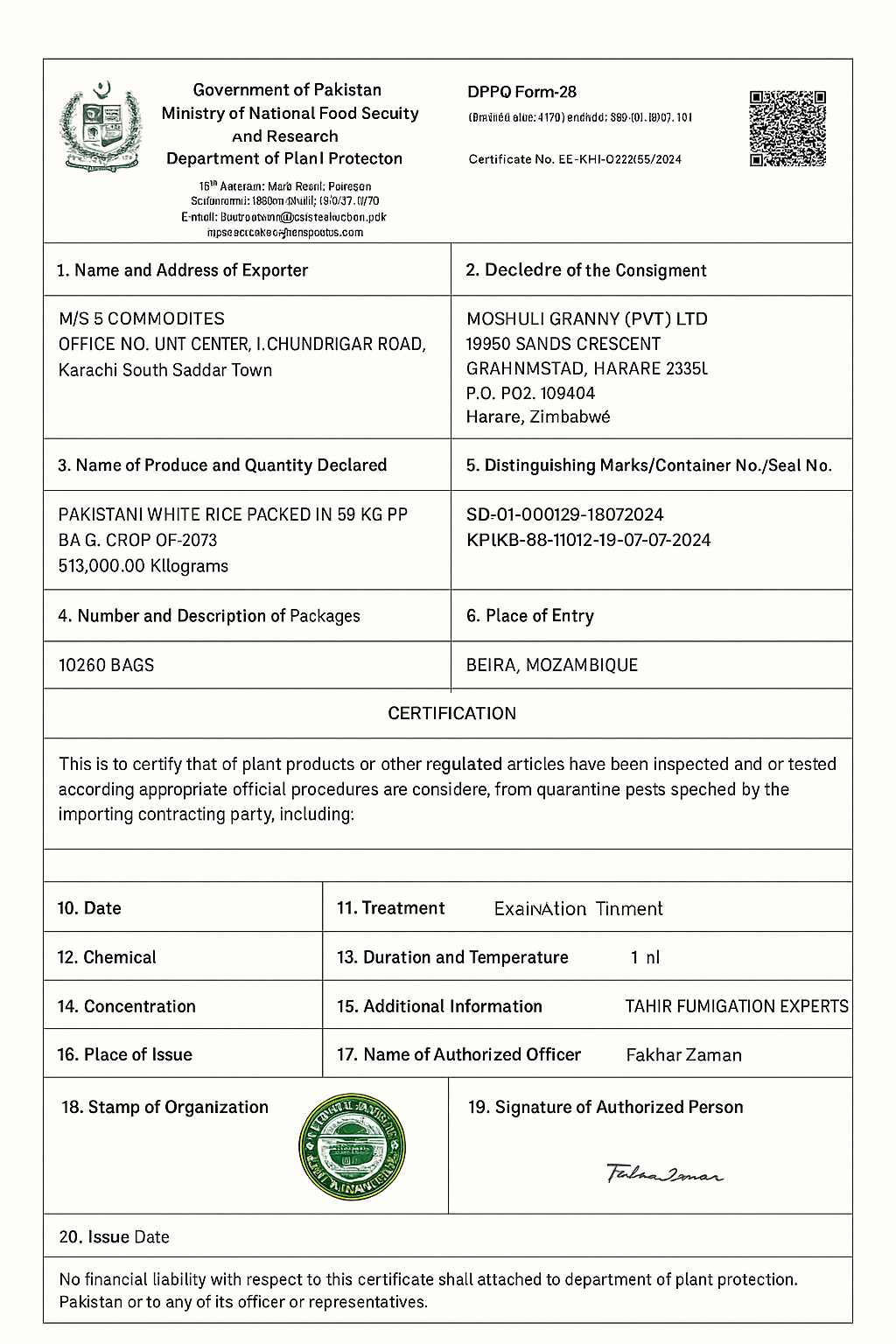When you export plants, seeds, or fresh produce, one certificate can decide whether your shipment clears customs or gets rejected — the phytosanitary certificate.
A phytosanitary certificate confirms that exported plants or plant products are inspected, pest-free, and compliant with the importing country’s rules.
For many exporters, it can be confusing to figure out which products require this certificate and which do not.
That’s why we created this detailed guide covering definition, purpose, products covered, documents required, step-by-step process to apply, and common mistakes to avoid.
What is a Phytosanitary Certificate?
A phytosanitary certificate is an official document issued by the National Plant Protection Organization (NPPO) of the exporting country.
It certifies that the plants, plant products, or related materials in a consignment:
- Have been inspected by an authorized officer.
- Are free from harmful pests and diseases.
- Meet the import requirements of the destination country.
Think of this as a “health certificate” for plants. Just like people may need medical clearance before traveling abroad, plant-based goods need this certificate before crossing international borders.
Why is a Phytosanitary Certificate Important?
The main purpose of a phytosanitary certificate is biosecurity.
It acts as a precaution to protect humans, animals, plants, and the environment in the importing country from harmful biological risks. Governments and buyers in importing countries rely on this certificate to confirm that your goods are safe, pest-free, and disease-free, ensuring they won’t threaten local agriculture.
For exporters, the certificate helps:
- Prevent shipment rejection at the port.
- Avoid costly quarantine or fumigation delays.
- Build trust with overseas buyers.
- Ensure smooth customs clearance in foreign markets.
Who Issues the Certificate in India?
In India, the Directorate of Plant Protection, Quarantine & Storage (DPPQS) under the Ministry of Agriculture acts as the NPPO and issues phytosanitary certificates.
Exporters must apply online through the Plant Quarantine Information System (PQIS) portal. Once the application is submitted, inspections and treatments (if required) are carried out. The certificate must be obtained before shipping the goods.
Products That Require a Phytosanitary Certificate
Whether a product needs this certificate depends on the commodity type and the importing country’s rules. Generally, it is required for:
- Fresh fruits and vegetables
- Seeds and grains
- Cut flowers and ornamental plants
- Plant cuttings, bulbs, and tubers
- Herbs and spices (unprocessed)
- Wood and wood products
- Cotton and raw fiber
Products That Do Not Require Phytosanitary Certificates
Fully processed foods, canned goods, or manufactured plant-based products are exempt. In the case of wooden packaging material, compliance with ISPM 15 standards is often sufficient instead of a phytosanitary certificate.
Types of Phytosanitary Certificates
There are two main types of phytosanitary certificates in India:
1. Phytosanitary Certificate for Export
- Issued when goods are exported directly from India to another country.
- Confirms inspection, treatments (if any), and compliance with the importing country’s rules.
2. Phytosanitary Certificate for Re-Export
- Issued when goods imported into India are later exported to a third country.
- Confirms that the goods remained pest-free while in India.
- Exporters must attach the original certificate from the country of origin.
Information Included in the Certificate (Format of Phytosanitary Certificates)

A phytosanitary certificate usually contains the following details:
- Name and address of exporter and importer
- Botanical name of the product
- Quantity, weight, and packaging details
- Country of origin
- Place of inspection and date
- Phytosanitary treatments (e.g., fumigation, heat treatment)
- Additional declarations (if required by the importing country)
- Inspector’s name, signature, and official stamp
Documents Required to Apply For Phytosanitary Certificate
In India, exporters need the following documents to apply:
- Commercial invoice with product details and value
- Packing list with weight and dimensions
- Certificate of Origin (for certain countries)
- Export license (if applicable)
- Treatment certificate (for fumigation or other treatments, if done)
- Bill of Lading or Airway Bill
- Original phytosanitary certificate (for re-export consignments)
Step-by-Step Process to Get a Phytosanitary Certificate in India
Here’s how exporters can obtain a phytosanitary certificate:
Register on PQIS
Sign up on the Plant Quarantine Information System with your IEC code and business details.
Apply Online
Log in, select the certificate type (export or re-export), and enter consignment details.
Prepare Required Documents
Upload or provide documents such as invoice, packing list, and certificate of origin.
Inspection and Treatment
Authorized officers will inspect the consignment. If needed, treatments like fumigation are carried out.
Laboratory Testing (if required)
Some consignments may require laboratory testing for pests or diseases, depending on the product.
Approval and Issuance
Once the consignment clears inspection and testing, the NPPO issues the certificate.
Provide to Importer
The exporter must include the certificate with the shipping documents for customs clearance at the destination country.
Common Mistakes to Avoid While Applying For Phytosanitary Certificate
Many exporters face rejections because of small but costly errors. Avoid these mistakes:
- Using incorrect botanical names instead of scientific ones.
- Missing additional declarations required by the importing country.
- Shipping without ISPM 15-certified wooden packaging.
- Applying for the certificate after goods are dispatched.
- Failing to attach the original certificate for re-export consignments.
FAQs on Phytosanitary Certificates
1. What is the validity of a phytosanitary certificate?
It is valid only for the specific consignment it was issued for. Some countries require it to be issued within a few days before shipment.
2. Who provides a phytosanitary certificate in India?
The Directorate of Plant Protection, Quarantine & Storage (NPPO of India) issues it through designated Plant Quarantine Stations.
3. Is a fumigation certificate the same as a phytosanitary certificate?
No. A fumigation certificate only confirms that a treatment was carried out. If needed, fumigation details are included within the phytosanitary certificate.
4. What are the charges for a phytosanitary certificate?
Charges vary based on inspection requirements, lab tests, and treatments. Fees differ depending on commodity type and the plant quarantine station.
5. Is it mandatory for all exports?
No. It is mandatory only if the importing country requires it for that commodity.









